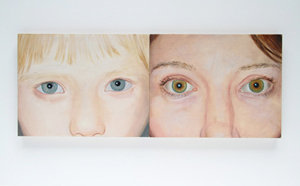Ellen Harvey
dal 28/4/2010 al 4/6/2010
Segnalato da
28/4/2010
Ellen Harvey
Magnus Muller, Berlin
The Doppelganger Collections expands Harvey's on-going exploration of the 'seductive dangers of reflection', presenting a variety of collections of problematic mirrorings that range from the personal to the public. Harvey confronts the viewer with the most intimate and problematic kind of mirroring - that of parents and their children - in a series of diptychs of close-up portraits of the eyes of mothers and their children.

The Doppelgänger Collections expands Ellen Harvey’s on-going exploration of the “seductive dangers of reflection”, presenting a variety of collections of problematic mirrorings that range from the personal to the public.
The Museum of Failure, exhibited in the 2008 Whitney Biennial, consists of two related “rooms”: The Collection of Impossible Subjects, a rear-illuminated plexi-glas mirror hand-engraved and sanded by the artist to create a drawing of an old-fashioned salon style hanging of empty ornate frames and, visible beyond it, Invisible Self-Portrait in My Studio, a painting of the identical collection of frames containing views based on a photograph taken in a collection of mirrors of the artist painting the piece in her studio. In the first instance, context (the frames, the mirrored viewer) obliterates subject matter. In the second, the elaborate context and the invisibility of the artist (who is obscured by the camera’s flash) serve to highlight the failure of self-portraiture as well as the all too common collapse of art’s higher aspirations into narcissistic self-reflection.
In Public Collection, the viewer’s image intrudes into a collection of mirrors that reflect a photograph of a found collection of paintings for sale on the street in Poland. By contrast, Home Decorating Alternatives (with Monochromes) narrows the focus to the personal collection in a series of diptychs that show mirror images of all the places the artist has lived in New York decorated with alternative hangings of fictional collections of monochrome paintings, ludicrously reducing the self-expression of interior decorating to a minimalist choice that reflects almost nothing about the works’ supposed collector. Lastly in Doppelgangers, Harvey confronts the viewer with the most intimate and problematic kind of mirroring – that of parents and their children – in a series of diptychs of close-up portraits of the eyes of mothers and their children.
Ellen Harvey was born in the United Kingdom and lives and works in Brooklyn, NY. She has exhibited extensively in the U.S. and internationally and was included in the 2008 Whitney Biennial. Recent solo exhibitions include Ruins are More Beautiful at the Center for Contemporary Art, Warsaw, Poland, Empty Collections at Meessendeclercq Gallery, Brussels, Private Collections at Locks Gallery, Philadelphia, The Museum of Failure at Luxe Gallery, New York, Beautiful /Ugly at Magnus Müller in Berlin and Bad Mirror at Galerie Gebr. Lehmann in Dresden, Mirror at the Pennsylvania Academy and A Whitney for the Whitney at Philip Morris at the Whitney Museum at Altria. She took part in the Whitney Independent Study Program and the PS1 Studio Program.
Recent awards include a Pennies from Heaven Grant, a Philadelphia Exhibitions Initiative Grant, a Rema Hort Mann Foundation Grant and a Palm Beach County Cultural Council Grant and a New York Foundation for the Arts Fellowship. She has completed projects for both the New York and Chicago Transit Authorities, most recently including a mosaic for the new Metro-North Yankee Stadium Station. Her book The New York Beautification Project was published by Gregory Miller & Co. in 2005 and a survey of her work, Ellen Harvey: Mirror, was published by the Pennsylvania Academy in 2006. This is Harvey’s third exhibition with Magnus Müller. Her exhibition Picturesque Pictures will be showing simultaneously at Galerie Gebr. Lehmann in Berlin.
Ellen Harvey is giving a talk at he Galerie Gebr. Lehmann on the 6th of may 6-8 pm
Opening Thursday 29th of may 6-9 pm
Magnus Müller
Weydinger Strasse 10/12, D-10178 Berlin
Tue-Sat 12–6pm



